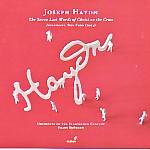Under the work’s title, in small print on the CD slip-case, we find the words “Intermezzi: Ron Ford (2004)”. This made me nervous. For some incomprehensible reason, even though Haydn regarded The Seven Last Words as a stand-alone concert piece (albeit a special one)–even to the point of adding the final “earthquake” for this purpose (or so musicologists speculate)–period-instrument folks ironically refuse to let the music speak for itself as Haydn wrote it. Attempts to recreate the original circumstances of performance, with full-blown sermons in between each piece, are obviously foolish. But absent the real (and unique) circumstances for which the work was composed, it’s not uncommon, as with Savall, to insert some kind of spoken nonsense between the seven “words” (or sonatas) anyway, in order to spare modern listeners the strain of hearing Haydn’s actual music played continuously.
Franz Brüggen has taken this process one step further, asking American composer Ron Ford to add even more ridiculous musical rather than verbal nonsense for insertion between the movements. Happily, these “intermezzi” only last about a quarter of a minute each. They consist of a few ugly, dissonant chords–a sort of post-Webernian commentary in the form of a juicy, phlegm-filled clearing of the throat before moving on. However, unlike Savall’s solution, these additions are not tracked separately, and so you can’t simply program them out. This was cruel, and so leads to a further reduction in the performance rating above.
It’s all the more sad because Brüggen leads a wholly gripping musical performance–at least as fine as Savall’s, with a bigger orchestral sonority and a generally finer contribution from the wind section. Listen to the bite of the horns right at the start; to the wonderful bleakness of the central Sonata (“My Lord, Why Hast Thou Abandoned Me?) in Haydn’s “personal” F minor; or to the delicious wind and pizzicato strings illustrating “I thirst.” The final earthquake is also tremendous, and because it follows directly on the consoling last Sonata there’s none of Ron Ford’s musical mucous to deal with beforehand. It’s so sad, not to say weird, to see proponents of “authenticity” and period style showing so little confidence in the music they claim to be faithfully recreating. Still, this is a magnificent performance of Haydn’s masterpiece; and if you love the work, and the silly, inartistic presentation doesn’t ruin the experience for you, I can recommend it accordingly.
































